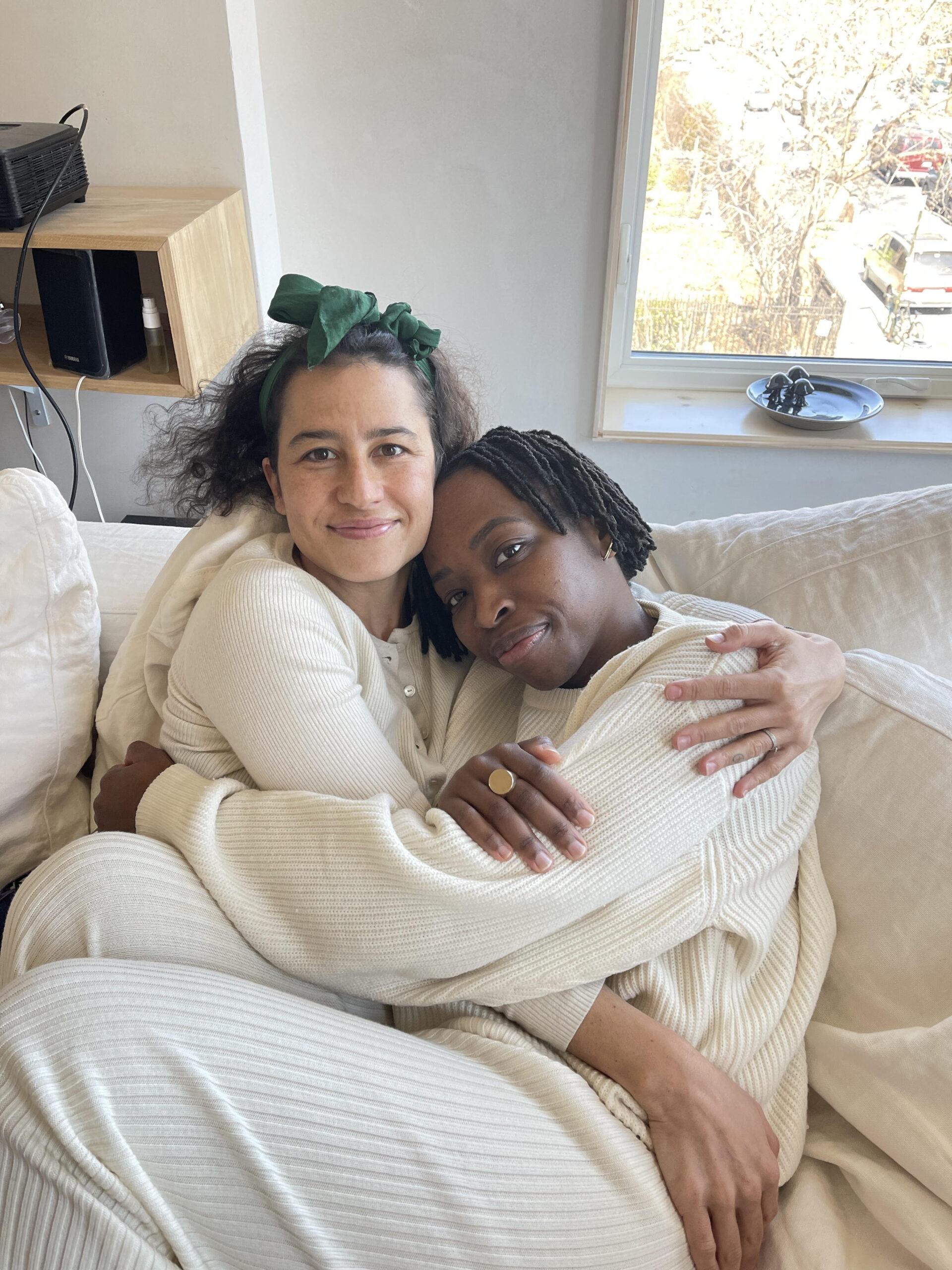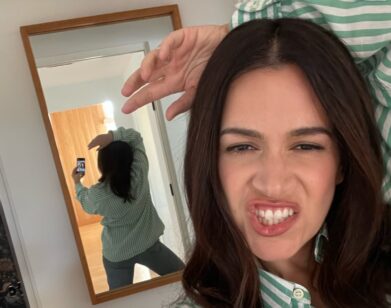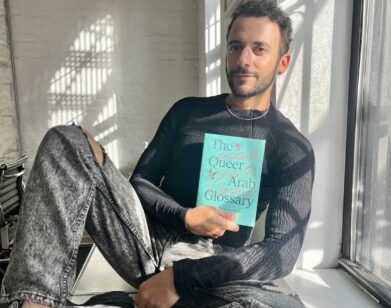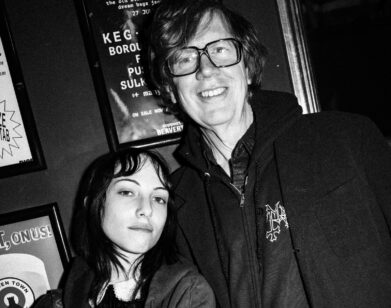FOUNDER
Erica Chidi Is Bringing Sex Education Straight to Your iPhone
“What a time to be alive, my dear,” said Erica Chidi when she got on a call with her friend Ilana Glazer last month. “There’s just an inordinate amount of helplessness, but I do feel momentum almost every time I talk to you.” Glazer feels it, too, thanks at least in part to trailblazers like Chidi, the 37-year-old co-founder of Loom, the former Los Angeles-based brick-and-mortar outlet for reproductive health which, earlier this year, launched its first-ever full-scale app. What began as a space to provide women and non-binary people with information about sexual and reproductive health—Chidi is a former doula, and also an author and professionally trained chef—has evolved as a veritable wellness brand. “I had a healthy pregnancy experience, and a big part of that was my access to Loom,” Glazer said. “It’s such an inspiring and tangible example to me of injecting health into a sick system.” Over Zoom, she and Chidi talked about how they’re trying to hold their grief over currents events in their bodies. “Feel free to lift all the heavy stuff,” Glazer joked. “It’s just impossible for us to be real with each other without being real.”
———
ILANA GLAZER: Hey.
ERICA CHIDI: Hi, cutie with the bow.
GLAZER: Hi. Little gift for you today.
CHIDI: I love that. What a time to be alive, my dear.
GLAZER: Crazy, crazy. It’s so weird to know consciousness is changing while it changes. I didn’t have that concept. Maybe I’m old enough now to be able to hold it. It’s just so funny, like we’re giggling right now, giggling out of grief.
CHIDI: Giggling out of grief. I mean, that part. This is also one of the things I love about you and our brain connection—I was thinking before we hopped on this call, does the severity of life right now have to do with being old enough to metabolize it?
GLAZER: Actually, I don’t think so. I think all ages are, but I think it’s harder for younger people because they’re experiencing it, but unconsciously, and not metabolizing it. I feel so grateful to be 36 right now.
CHIDI: I feel grateful to be 37 and to be able to have the discernment. And to also, at the same time, have some autonomy and some sense of safety.
GLAZER: Yeah. You and I have been talking personally and privately about the events going on in the Middle East and how painful it is. We’re speaking here from relative safety in the US. From where we are, the balance between personal peace and being engaged with the suffering of the world, it’s like Buddha, you know what I mean?
CHIDI: Yeah. If we’re being honest, no violence is okay. I think that what happened in Israel is abhorrent, and I cannot sit by and support terrorism in any capacity. At the same time, I cannot support retaliation at the same level of intensity in Gaza that was inflicted upon Israel by Hamas. We have to denounce terrorism in all its forms.
GLAZER: Yeah.
CHIDI: At the same time, though, when I think about my work in sexual and reproductive health, and when I think about reproductive justice, there is a reproductive justice crisis in Palestine right now because of the fact there’s so little infrastructure. No matter your politics or religion, we have to acknowledge the lack of resources and lack of infrastructure, and what that does to people that have uteruses, that have vulvas, that have the capability to bleed. I mean, right now in Gaza, women and uterine-bearing people are taking pills to stop their periods because there isn’t proper sanitation to support them. I can’t even imagine being pregnant right now.
GLAZER: Oh my god.
CHIDI: It’s one of the reasons why I was fundraising for Doctors Without Borders, because they’re one of the few NGOs that are committed to abortion, regardless of where they are in the world. Because why would you want to be pregnant in a place where there’s no running water? Especially as someone who’s Black and Jewish, which is a conversation that we’ve had about our spirituality and our identification, [we must] also extrapolate that away and out from the fact that we are humans first.
GLAZER: We were just talking about this last week, thinking of Palestinian girls bleeding during forced evacuation. It’s horrific, and to boil it down to that human experience just makes it so much more understandable than the violence happening at the grand systemic level. God, it’s crazy. Our whole lives, we’re indoctrinated to be dehumanized. This is a global, systemic thing, but here, it’s like we’re separate countries, we’re separate states. Violence against Palestinians has been happening for a long, long time, antisemitism has been happening for a long, long time. But when these large-scale, traumatic events happen, it’s so clear that we are one organism, because we’re all feeling it in our bodies. We’re not just thinking of them. We’re feeling our planet aching, being violated, and hurting itself. I’ve been kind of just starting to open up to my Jewish community to be able to talk. I’m taking it slow.
CHIDI: So slow.
GLAZER: Consciousness is different than it’s ever been before. We can talk about the way things are, but they’re not the way they’ve ever been.
CHIDI: They’re not the way they’ve ever been. We are more technologically connected than we’ve ever been, and I think that’s the component we aren’t exploring or understanding enough. I grew up in post-apartheid South Africa, and I think I know what it feels like to feel othered, because even though I was Black, I was not South African. I was Nigerian-American, which created this stellium of reasons why I didn’t feel like I could really be integrated, so this feeling of place or home has always been something to me. Which is why the body is such a major focus for me, because sometimes that is your only home.
GLAZER: Right. Oh my god. That’s beautiful.
CHIDI: In connection to what you were saying about talking to your white, Jewish community, another one of my strange intersections is when I was in college, I went to college in University of Cape Town. I minor-minored in religious studies, and I did a year’s worth of study around antisemitism. I think, even though there’s so many different ways to look at what’s happening right now, [there is] an overt and semiotic intensity around antisemitism, in the sense that the whole thing that people don’t realize about antisemitism is that it’s really covert, and it’s so subtle, and it’s very easy for it to reassert itself. It’s almost like it’s bodybuilding in the basement, and then someone opens the door, and it’s ready to just run into a competition. There’s never any days off for it.
GLAZER: No days off.
CHIDI: So there is a part of me that feels hyper-aware of the resurgence of that and the fear around it, because it’s so powerful and so discreet, and it doesn’t look like the violence that’s being committed right now, both in Israel and Palestine. It is much like what it feels like to be in a Black body and to feel a sense of constant fear and discrimination, whether or not you clearly are Black or not, because you understand that, by having any association with this entity or identity, it equals extinction in some way or sense, whether that extinction is tangible or intangible. And I think that’s also the legacy of trauma. Does that make sense?
GLAZER: Yeah. It makes perfect sense, and that’s really what I wasn’t able to hold. I was not able to hold the antisemitism, because I feel like it’s gotten such a bigger focus in the national and global narrative than the violence against Palestinians. But I have been personally experiencing, and personally experiencing through my community, the rise of antisemitism. At first, I could not look at it. I could only focus on the one thing, on the violence against Palestinians, and I feel my white Jewish community feeling let down by me not representing the rise of antisemitism more, at least yet. I also wasn’t able to look at it because it regards my body, and there’s actually a narcissism in not being able to recognize my own vulnerability. It’s so scary to engage with. I mean, I’m literally a comedian. And we have been trained by the media. The binary is a tool of oppression. It separates Black people from white people, and I say this with a particular harsh affect that you can’t read in print, so I’m spelling it out for Interview. Humans share so much DNA. [But] we’re separated for this larger system, Jews and non-Jews, men and women. It’s unbelievable how easy it is to fall into picking sides. I want it to stop for many reasons, but first and foremost, I’m struggling to hold it in my body.
CHIDI: And that’s the thing; it’s the holding in the body that I am really negotiating. I think something that I’ve been thinking a lot about in my work with Loom, and then also in my personal work, as I’m working on my second book. The mind and the body are not disconnected. They are in concert.
GLAZER: Yes, yes.
CHIDI: So I’m always perseverating around this idea of embodiment, and what is it, and what does it truly mean? And the fact is, when we’re angry, our muscles tense. When I’m sad, I get abdominal migraines.
GLAZER: Wow. Yeah.
CHIDI: My stomach takes it on. So I think our body is our mind.
GLAZER: Dude, I’m so on this fucking tip. Yes, please.
CHIDI: Right? I’ve always felt a lot of affinity with you because we’re both big movers. It is a lot of gesticulation. It’s a lot of clapping, smelling, doing things, and I have to say that, as I’m getting older, I’m realizing that that type of constant kinetic movement is a way of processing that isn’t about sitting on a meditation cushion or even going for a walk. Because sometimes having the executive functioning to be like, “Okay, I’m going to do this thing, and then this thing, and then this thing to feel this thing is just not fucking possible.” So when I hear you saying you’re feeling it in your body, I’m like, “Yes, you’re feeling it in your body, you’re feeling it in your mind.” In terms of taking care of ourselves right now, I’m giving myself permission to remember myself and move, because when there’s any type of threat, with the amount of violence that we’re having to just ingest, there’s this feeling of just wanting to totally evacuate yourself.
GLAZER: Right, right. I have to respond to a few things here. As toxic and actually violent as social media is, it isn’t by nature. It is by the nature of very few people controlling the algorithms, and it’s at least made violent when it starts to mirror power structures that we already live in. What’s amazing about social media is the connection of global conscience, and being able to map its change on a daily fucking basis. I feel like ten years ago, “mind-body connection” became this phrase and this concept that most people can understand. The mind and the body are the same thing. But we’ve actually been made to think that you can outthink your feelings, which are felt in the body, and I think the separation of the mind and body is actually what allows for this systemic violence. And I think the separation of the mind and body is part of what has led us here, to be in this place where we can hurt people without thinking about it too much. If you think about it, then you start to have feelings, and if you feel it in your body, the majority of people committing violence would stop. I think some people are truly ill, sociopathic, and love violence, but I believe most people want basic human rights for all.
CHIDI: It makes me think a lot about Loom. What we were trying to do with the app is really bring together the stories from women around the world about their health experiences, about their embodied experiences, and then couple it together with this biomedical, practice-based health information that women, non-binary people, and anybody with the uterus and the vulva has been systematically denied. I think when you talk about this potentially pre-organized fissure between our minds and bodies in order to keep us in disarray, it’s, “We don’t want women to understand their bodies. We’re going to make it feel very difficult, and make it feel like you have to be very skilled to be able to take in this information.” Even in the short few weeks that the app has been live, there’s a desire for this kind of information. We really focused on the fact that there is a general attention deficit, and a severely tight attention economy, and that women and non-binary people tend to be the most time-poor. They don’t have the time to sit behind a computer, read a book in depth, or even read an article in depth. So how do you really solve for that lack of health literacy that is disenfranchising people from making good decisions about their health without creating more work for them? That’s really what the app has been about, making it easy to learn about your health and then really building in that storytelling piece, because our stories are education and stories are healing, especially when we are in moments of collective despair, like we are right now.
GLAZER: Yeah. I had a healthy pregnancy experience, and a big part of that was my access to Loom. It’s such an inspiring and tangible example to me of injecting health into a sick system, and making the sick system healthier. I would love to see the day when Loom is the standard that general practitioners and OBs use with their patients to log their symptoms and health between appointments or something. Is that incorrect? Should I rescind that?
CHIDI: No, that’s totally right.
GLAZER: Yeah, and also being in touch with your own symptoms, to have a log of it, to be able to basically tell your own story around your health. To be able to engage with Loom and log into the app feels humanizing to me as an individual. To hear about others’ experiences with their bodies reminds me of my own relationship with my body, and I find it helpful to claim my body as my home.
CHIDI: Yeah, that part, being able to just claim your body as your home, and also just decolonizing education. There’s repair happening. It doesn’t feel as tangible right now, because there’s just an inordinate amount of helplessness, but I do feel momentum almost every time I talk to you.
GLAZER: Yeah. Oh my gosh. What an honor. This outbreak and spike in violence in Gaza and Israel really has shifted me. As I’m talking to you, I’m almost embarrassed to have hope. I’m like, “Is this a joke, my hope?” It’s almost absurd, given the context, but I feel like I have hope in humanity. I want to tell people you should get the Loom app, but I wouldn’t, because it’s almost like, “you should join such and such, you should believe in this or should believe in that.” That doesn’t appeal to me, but letting someone know Loom is there, I think, is almost like a practice of kindness.
CHIDI: I do also think that it is a practice of kindness to selectively disengage. I mean, I’ve had really powerful conversations over the past couple of days with different people that I really respect. Social media, in many ways, is this space of continuous confirmation bias and this echo chamber. It’s what you do offline that matters. A lot of people are like, “You haven’t said anything or done anything on social,” but you have no idea what that person was doing behind the scenes. I just don’t believe that social, in any capacity, is a barometer of someone’s integrity or acumen. It’s a voluntary platform. I just can’t stand people being measured based on their participation in social.
GLAZER: I know. It’s sick.
CHIDI: It makes no sense to me. But at the same time, you were talking about the different ways in which you might show up, and I do think that humor is so important right now. I need the LOLs. I’ve got to have them.
GLAZER: Same. I was headed to Minneapolis and Omaha. It was Monday when the Israelis were attacked and taken as hostage, and then this horrific evacuation on Wednesday, Thursday, Friday of Palestinians. I am connecting with artists and friends, but I’m doing shows Thursday, Friday. I’ve been having so much fun on the road, but that week I was like, “Wow, I really want to be home.” But then the magic of connecting with people, and creating a space to laugh, really shocked me. I’ve never stood that test with comedy. I’ve done comedy in challenging times, personally and globally, but it was so extreme. Grounding myself in my body was obviously the only way that I could really take pleasure. Because how else can you take pleasure but in the confines of your body?
CHIDI: That’s so right. It’s a reminder to me to find more outlets for laughter right now. I also feel grateful for people like you in my life, who are a direct line to that.







